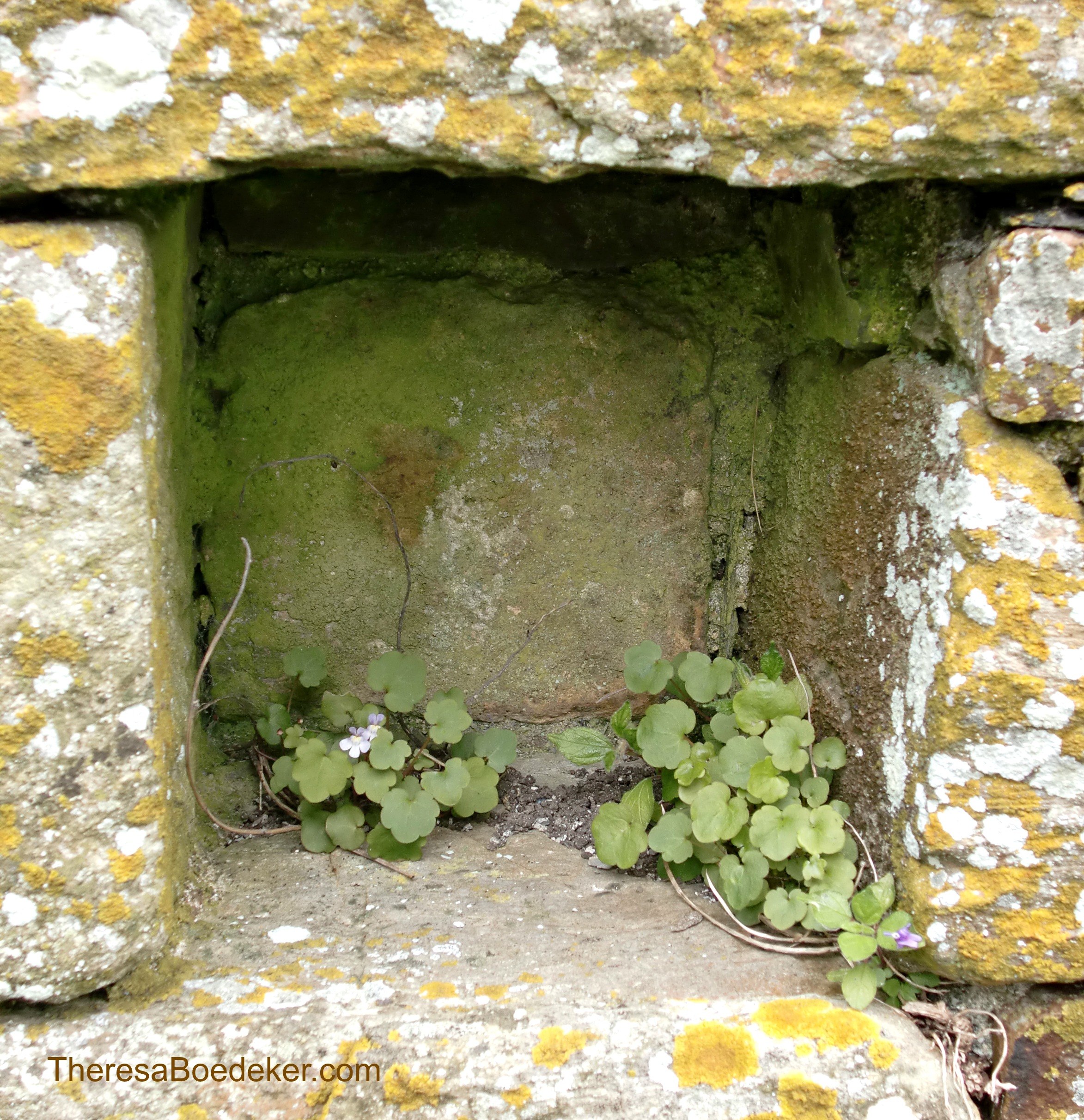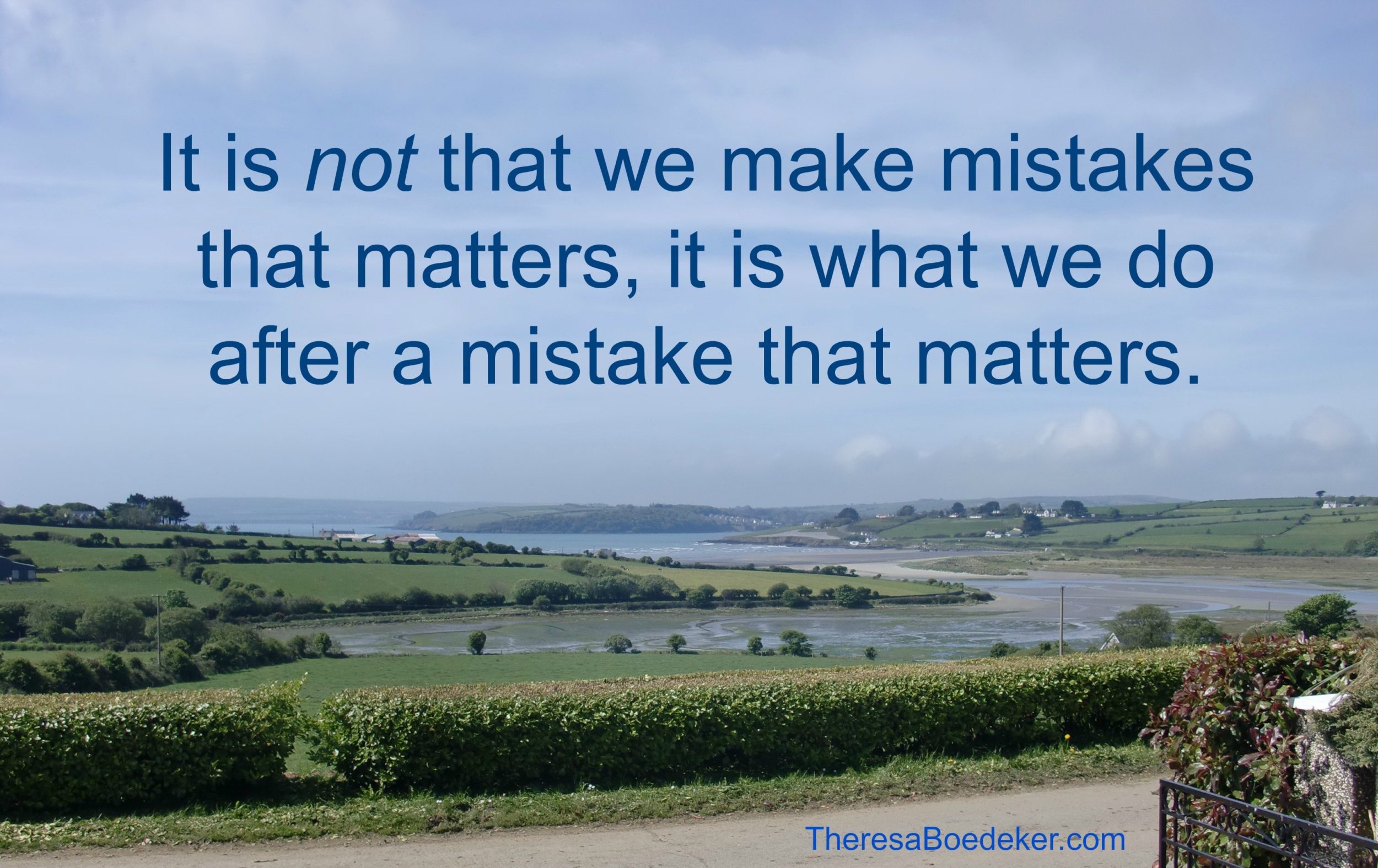


 This is part two of a series on ‘responding to mistakes and what do you do?’ Read part 1 here.
This is part two of a series on ‘responding to mistakes and what do you do?’ Read part 1 here.
Mistakes in life happen. Everyday. All the time.
Live long enough and you’ll make some. Try something new and you will make mistakes.
Ever try to learn to play basketball and not make mistakes? Ride a bike? Bake a three-layer chocolate cake? Write calligraphy? Perform some math? Practice the piano? Give a speech?
We cannot learn something new and not make mistakes.
Ever try to multi task? Cook dinner and talk on the phone? Maybe that isn’t too hard, but throw in a few whiny children and a dog whimpering at the door and the chances that you will make a mistake sho0ts up exponentially.
Get busy, distracted, or survive on little sleep, and mistakes happen at an even faster rate.
The problem is we are not machines. We are not perfect, try as we might. We are humans and humans make mistakes. Without meaning to. Without trying to.
How do you respond when you make a mistake? Do you do these 7 harmful things?
What to remember when we make mistakes?
How can we give ourselves the freedom to make mistakes and then use them to our advantage?
1. First of all, remember that making a mistake is not the end of the world. At least not as we know it. The earth keeps spinning and the stock market keeps going up and down.
2. Making a mistake just means we are human. We are in good company because all the other people in the world are human too and can relate to and have made mistakes. We are only acting as a human should and will act.
This is important to remember when we make a mistake. We are no different from all the other billion people on earth. We are all mistake makers. Plain and simple.
No one alive has not accidentally forgotten something important, botched a task, said the wrong thing, failed to notice something or someone, given the wrong answer, selected the wrong choice, or carelessly tripped over their own feet.
3. It is not that we make mistakes that matters, it is what we do after we make a mistake that matters. Our response matters more than the mistake.
So, what can we do when we accidentally make a mistake?
Let’s pretend we turn around quickly and spill wine down the front of someone’s dress shirt. A simple mistake that embarrasses us and affects someone else.



Making mistakes in life and learning from them | How to respond to mistakes:
1.Take responsibility. Plain and simple, accept responsibility and admit you made a mistake. (I’m sorry I spilled wine down the front of your pristine white shirt.)
Admitting our mistakes can be hard, but it is necessary (and it gets easier with practice and time). This tells the other person, who your mistake affects, that you are human and it acknowledges that your mistake is affecting them in some manner.
The last thing we want to do is blame them. (What are you doing standing so close to me. Now look what you made me do!) Blaming them makes them feel powerless and degraded and often causes them to retaliate in anger.
It is not their fault, we made the mistake. Take responsibility and admit you are human.
The funny thing is, when we admit we made a mistake, the other person often responds with graciousness and kindness, or at least a little understanding because they know they are also human and they can empathize with your mistake.
And if they are not gracious? Remember you are only in charge of your own responses and actions. They can choose how they will act and respond because they are in charge of their own actions and responses.
 2. Figure out if there is a way to fix or solve the mistake. (Can I get you a clean shirt to wear while I treat that stain?)
2. Figure out if there is a way to fix or solve the mistake. (Can I get you a clean shirt to wear while I treat that stain?)
This is not the time or place to beat yourself up, lecture yourself, or call yourself names. None of which are helpful or solve the problem.
Sometimes there is something you can do, and sometimes there is nothing to do. If you burn dinner, you can throw together some sandwiches. If you step on someone’s foot, you can’t do much more than apologize. Apologizing won’t take away the stiletto heal indentation in their foot, but it does acknowledge their pain and your part in their pain.
 3. Ask yourself if there is a way to keep from making the same mistake again. (Maybe not turn around quickly when in a crowded room. Especially when holding a glass of wine.)
3. Ask yourself if there is a way to keep from making the same mistake again. (Maybe not turn around quickly when in a crowded room. Especially when holding a glass of wine.)
Brainstorm about what could you do differently. What can you do in the future to not make the same mistake again?
Once again, this is not the time to whine and bemoan and send yourself on a guilt trip to make yourself and all those around you miserable. Going down that path is not healthy for you or others and it does not solve the problem or address the issue.
Sure, you messed up. Now get back up, dust your knees free of the dirt, and forgive yourself and sprinkle some grace on yourself. That is what you would do for your best friend. And vice versa.
Figuring out ways to keep from making the same mistake again, empowers you and puts you in charge of your actions and reactions.
If you back out of the garage before the door is fully risen, you can make a mental note to yourself to double check that the whole door is raised past the car height before turning the car on. Knowing how the mistake was made, helps you avoid the same mistake in the future.
 4. Ask if you made the mistake on accident or because you don’t know how to do something. (Spilling the wine was clearly an accident. You can usually walk across a room without a mishap.)
4. Ask if you made the mistake on accident or because you don’t know how to do something. (Spilling the wine was clearly an accident. You can usually walk across a room without a mishap.)
Sometimes we make a mistake in math because we fail to carry our tens when adding double digits, and other times we make a mistake because we don’t know how to figure out the volume of a hexagon. Both are mistakes. One comes from not remembering to do a step and is just a silly mistake; the other comes from not knowing how to do the task.
If it was an accident, no big deal. If it was because you don’t know how to do something, then figure out if you want to learn and solve that deficit. Either way, don’t beat yourself up.
 5. Ask what you can learn from your mistake. (Be careful in crowds of people, especially when carrying liquid. Or maybe you have an ah-ha moment and realize you are prone to make big hand movement when you are excited.)
5. Ask what you can learn from your mistake. (Be careful in crowds of people, especially when carrying liquid. Or maybe you have an ah-ha moment and realize you are prone to make big hand movement when you are excited.)
Our mistakes are never wasted when we try and learn from them.
Remember Edison and all the times he tried to figure out what material to use as the filament of the light bulb? He looked at each failure as narrowing down the list of materials that would work.
Look at your mistakes as steps in learning. Learning more about yourself, others, the world, how things work and don’t work.
Learning from our mistakes turns them to our advantage. Learning effects the future positively.
When we show up to the dentist a week early we can remember to look at the calendar before setting out for an appointment next time. When our speech flops because we were not prepared, we can make sure we start planning earlier next time.
Isn’t life just one big learning curve? We are here to learn. Learning from our mistakes puts us in the seat of power and helps us feel empowered. We can’t eliminate mistakes from our life, but we can learn from them and adjust our behavior and make the same ones less and less.
Give yourself the power to make mistakes and learn from them. When we do this, it is easy to yell, “Yah for mistakes!” because that means we are growing and learning from our humanness. We are improving and bettering our self.

 6. Find the humor in your mistakes. If we can smile and perhaps laugh at our mistakes, now or ten weeks later, it diffuses a lot of ill will, guilt, and anger we can direct at our self because of our mistakes. Laughing at our self also helps us forgive our self more quickly.
6. Find the humor in your mistakes. If we can smile and perhaps laugh at our mistakes, now or ten weeks later, it diffuses a lot of ill will, guilt, and anger we can direct at our self because of our mistakes. Laughing at our self also helps us forgive our self more quickly.
Who knows. Maybe that mistake will turn into a funny story of accidentally pouring wine down the front of someone’s shirt during your St. Patty’s party.
When we can laugh at our mistakes, we are letting others know it is alright to be human and also make mistakes. When we laugh at our self and others laugh along, it is easier to show compassion and understanding to our self. And when others hear our story, they are more likely to show compassion and understanding to others in the same situation. In the process, we are understanding ourselves and others better.
Next time you make a mistake, use it to your advantage. That’s how to recover from mistakes in life. Because making mistakes in life and learning from them is all part of life.

 Next week part 3 in this series. How to respond to the mistakes of our children in a healthy manner?
Next week part 3 in this series. How to respond to the mistakes of our children in a healthy manner?
Other topic in the series:
How to Respond to Mistakes – yours and others
Why Mistakes Are Necessary and how we can learn from them and use them to our advantage
Dispelling the Lies of Mistakes that Steal Our Joy
How We Let Our Mistakes Determine Our Worth
How to Let our Children Make Mistakes and Fail
How Mistakes Can Be Blessings in Disguise
Looking at how to Deal With Large Mistakes with Big Consequences
Letting Others Make Mistakes and not trying to fix everything
Dealing With Critical Words from Others when we make mistakes
For listening: Life as it Comes, a story podcast, takes a humorous look at making mistakes in episode 31, “Have You Pulled a Theresa?”
Turn Your Children’s Mistakes into Learning Opportunities
Learn 10 steps to help you
Yes! I want the FREE RESOURCE to help guide me in creating
independent children that learn from their mistakes.
Join the Discussion: What are your tips for responding to mistakes?
Linking up at Jennifer Dukes Lee (#tellhisstory); and Holley Gerth (#coffeeforyourheart)
- How Knowing Your Husband Can Impact Him for Good - March 24, 2022
- How to Stop Focusing on What’s Wrong with You - March 9, 2022
- Is God Really Good All the Time? - February 24, 2022
I wish I had this author’s words on a poster. “It is not that we make mistakes that matters, it is what we do after the mistake that matters”. Great advice! Just by writing this series I think she is helping a lot of people who beat themselves up for their mistakes. A lot of hardworking, God-respecting people do that very thing. Bravo!
Thanks Colleen. I sure could have used those same words when I was younger and afraid of making mistakes. It seems if someone else does not beat us up for our mistake, we are experts at beating our self up.
Your photos are so beautiful! And the softness of the flowers growing against the hard stone walls, seems like a beautiful object lesson of being gentle on ourselves when those mistakes come! Thank you for sharing these great thoughts. I’m blessed to be your neighbor over at #TellHisStory this week.
Yes, we need to be gentle with ourselves when we make mistakes. Just like the flowers remind us! Thanks for visiting, Bettie.
I loved your post. I hate making mistakes but you are so correct, “It is not that we make mistakes that matters, it is what we do after the mistake that matters”.
I had to remind myself of this same thing last night. We left half an hour earlier than we needed to last night for a banquet because I was thinking of the time we needed to leave and mixed that up with the time we needed to be there. Argg. But you know what? Everything turned out fine. Making mistakes can be frustrating, but they are just part of life. We can beat ourselves up, or help set up when we arrive half an hour early. Blessings on your day Maree.
Theresa, How I feel after making a mistake has always been a terrible struggle for me. I used to beat myself up over them, but I’m doing better now. (Most of the time, anyway!) You give some great insights here all of which are great reminders. I wish I had had this kind of advice when I was younger! Thank you for sharing. The pictures are beautiful!
I hear you Leslie. If I could tell my much younger self something, it would be to not beat myself up over my mistakes. Thanks for your kind words and for visiting.